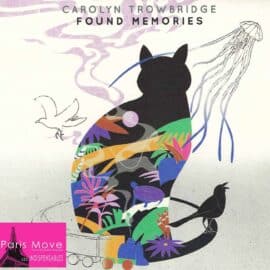| Jazz |

There are artists who enter your life the way a shift of light enters a room, not abruptly, not with spectacle, but with the unmistakable clarity of something that should have been visible all along. Carolyn Trowbridge is one of those revelations. It is a strange phenomenon of modern urban life that two people can inhabit the same city, frequent the same cafés, breathe the same cedar-scented air, navigate the same patchwork of creative neighborhoods, and yet remain invisible to each other. And then a work appears, luminous and insistent, and the question arises: How had I not heard of her sooner?
Trowbridge is not simply a multi-instrumentalist; she is the architect of an artistic world shaped by sensory memory, by childhood impressions that cling to the margins of adulthood. Her music begins long before the first note is struck, before the vibraphone glimmers or the percussion finds its pulse. It begins with a frantic grackle swooping into her childhood orbit, that emblematic Texas bird known for its mischief and defiance. These are not anecdotes; they are origin stories, fragments of a personal mythology that reveal why her music holds both the textured introspection of Europe and the expansive pragmatism of America.
To hear Found Memories is to understand how those early imprints became compositional logic. At the vibraphone, Trowbridge paints in gradients, soft, aqueous, luminous. Her soundscapes recall the fluid worlds of Roland Cat, the painter who captured light as if it were a sentient presence. It is a fitting comparison, for Trowbridge’s music gleams with a similar submerged radiance. Nothing is ornamental. Every shimmer of mallet against metal feels connected to some deeper emotional reservoir.
This is why, curiously, her album feels like a temporal threshold. I find myself discussing 2026 while still anchored in 2025, and it is because Found Memories sits precisely on that seam. If 2025 was the year a remarkable constellation of female artists reshaped jazz, offering work that was unapologetically intricate, tender, and forward-thinking, then Trowbridge’s album is both culmination and continuation. It offers what we didn’t fully know we wanted: a return to childhood refracted through adult intelligence. And there is, at times, something almost John Grisham–like in its cinematic pacing, not narrative in the literary sense, but cinematic in the way scenes are built, layered, and revealed, as though her compositions were crafted for wide angles and slow pans.
Positioning her among contemporary vibraphonists
If one were to place Trowbridge within the wider landscape of contemporary vibraphone players, she would sit comfortably, yet distinctly, alongside Sasha Berliner, Patricia Brennan, Joel Ross, and Simon Moullier. Like them, she treats the instrument as a portal into modern storytelling, not a relic of post-bop vocabulary. Yet her compositional imagination feels rooted in cross-cultural soil. The traces of classical rigor, the shadows of rock, the bright edges of pop, the rhythmic elasticity of world music, all of it threads itself through her jazz sensibility. She writes like an artist unafraid of being porous.
Her résumé reflects this openness. She has collaborated, recorded, and performed with the Grammy-nominated Black Pumas, Adrian Quesada, Graham Reynolds, Alex Coke, Star Parks, Hard Proof, Mike Portnoy, and more. In 2009, she appeared with the Grammy-winning choral ensemble A Company of Voices for a PBS special. In 2014, she opened for Snoop Dogg at ACL Live, an anecdote that might seem surprising until you realize that genre boundaries have never been particularly meaningful to her.
Austin as a quiet engine of artistic daring
To write about Trowbridge is also to write about Austin, not the mythologized Austin of guitar legends and late-night dive bars, but the Austin of the present: a city whose jazz scene has been quietly maturing into something more cosmopolitan, more collaborative, more daring. The artists here move fluidly between traditions. They play jazz at noon, rock at midnight, ambient music on the weekend. It is a place where experimentation feels less like rebellion and more like habit.
Trowbridge is a product of this ecosystem. Her music does not merely emerge from Austin; it absorbs its contradictions. The tension between rootedness and restlessness. The blend of structure and spontaneity. The habit of slipping between influences without apology. In this way, her work mirrors the city’s evolving identity.
The broader horizon
Found Memories is not simply an album, it is a statement of intent. It announces an artist stepping fully into her own aesthetic territory. With its distinctive tone, its singular imagination, and its circle of deeply attentive musicians, the project feels like a decisive step toward larger stages, from national jazz festivals to global circuits.
If there is a lesson embedded in this album, it is that memory, when treated not as nostalgia but as raw material, can become a form of forward motion. Trowbridge’s trajectory seems poised to be luminous, not because she chases innovation, but because she inhabits it naturally. She writes as someone who understands that the past is not a weight but a reservoir.
And so Found Memories stands as one of the early markers of jazz’s next chapter: subtle, cinematic, borderless, and attentive to the shimmering details that make a life. It is the sound of a childhood reframed by craft, and of an artist revealing, at last, what had been quietly forming in the background of our city.
Thierry De Clemensat
Member at Jazz Journalists Association
USA correspondent for Paris-Move and ABS magazine
Editor in chief – Bayou Blue Radio, Bayou Blue News
PARIS-MOVE, November 20th 2025
Follow PARIS-MOVE on X
::::::::::::::::::::::::
Musicians :
Carolyn Trowbridge, vibraphone & percussion
Elaine Barber, harp
Mario Castelanos, bass
Alex Coke, flute
Jason Frey, tenor saxophone
Brian Sunderman, guitar
Nick Tozzo, drums, percussion
Track Listing :
Thank You For The Memories, Thank You For The Laughs
Duchess Of Sheba
Chopin’s Seance
Grackle Vs. Tacotarian
The Lonely Frost Flower
Tookey’s Engine
Turtle Heart
The Old Woman Who Never Grew Older
Physalia’s Journey
Onward

